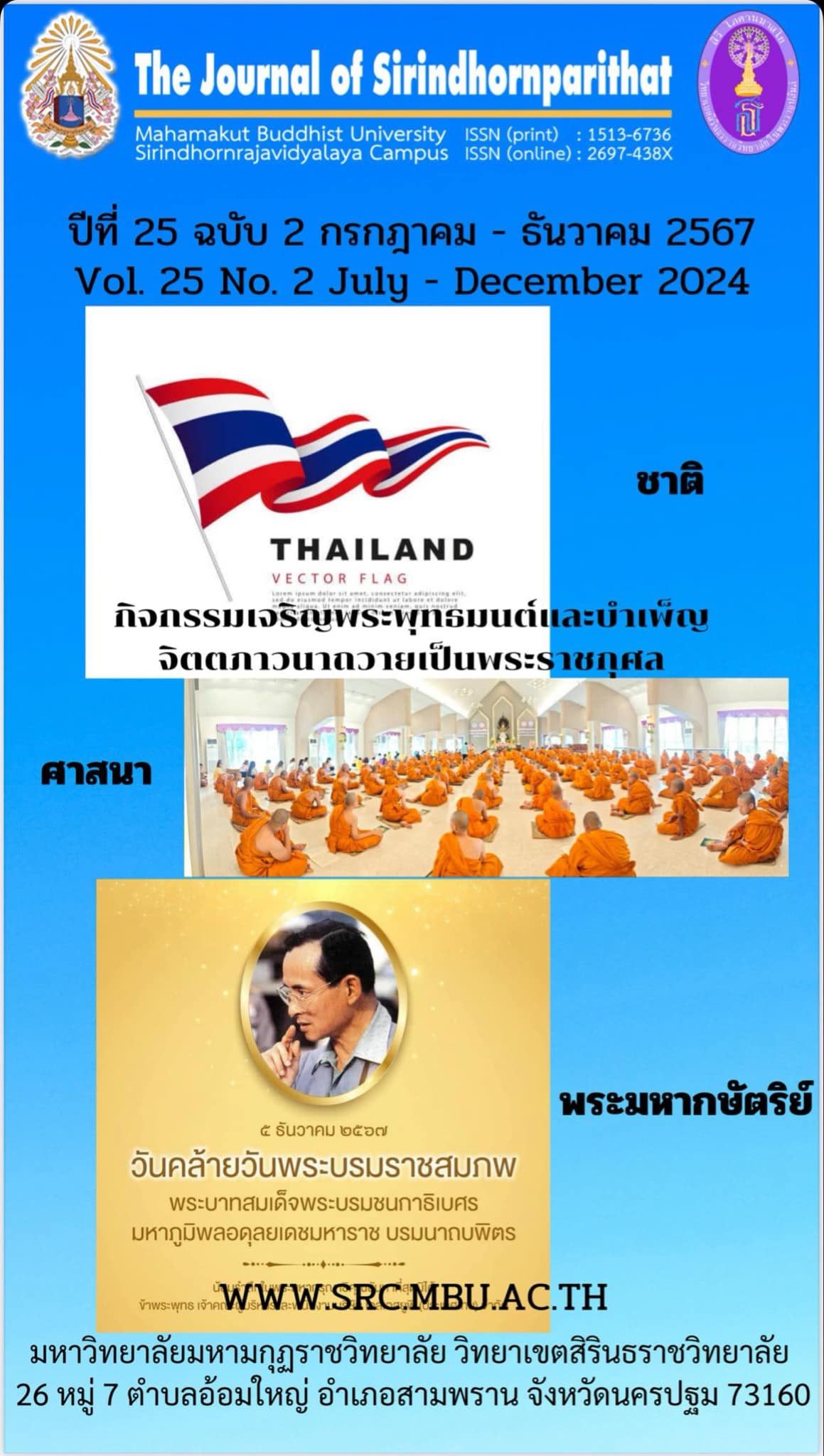factors affecting the quality of learning of myanmar in the 21ST century for thai students who choose to study the language of myanmar
Keywords:
learner quality, learning the Myanmar language, 21st centuryAbstract
The purposes of this research were to study 1) the level of Factors Affecting the Quality of Learning of Myanmar in the 21st Century, 2) the level of learner Quality of Learning of Myanmar in the 21st Century, and 3) Factors Affecting the Quality of Learning of Myanmar in the 21st Century. This research was a quantitative research. The sample group used in this research was the school director. Deputy Director of the School for Academic Affairs Myanmar language teacher and 374 students in grades 1-6. The research tool was a questionnaire with a reliability of 0.961. 373 sets of data were collected, representing 99.73%. Statistics used in data analysis namely mean, standard deviation and stepwise multiple regression analysis. The results showed that 1) The level of factors affecting learner quality in learning Burmese language in the 21st century was at a high level. In order of average from the highest to the lowest as follows: teacher factor Executive factor Educational resource factor learner factor 2) The overall level of learner quality in Myanmar language learning in the 21st century was at a high level. First was the learner quality in terms of learning skills and innovation. Followed by the quality of information skills learners. Media and Technology and the last order is and 3) the factors affecting learner quality in learning Burmese in the 21st century were the learner factors. parents Executive and educational resources was able to predict the quality of learners at 71.30% with a statistical significance at the .05 level.
References
บุศรา เต็มลักษมี. (2558). ปัจจัยที่มีความสัมพันธ์ต่อผลสัมฤทธิ์ทางการเรียนวิชาภาษาอังกฤษของนักเรียนชั้นมัธยมศึกษาตอนต้น จังหวัดประจวบคีรีขันธ์ สังกัดสำนักงานเขตพื้นที่การศึกษามัธยมศึกษา เขต 10. มหาวิทยาลัยบูรพา. วารสารวิทยาบริการ, 26 : 8
ปนัดดา นกแก้ว. (2562). ทักษะชีวิตและอาชีพในศตวรรษที่ 21 ของนักเรียนระดับชั้นมัธยมศึกษาปีที่ 3 จังหวัดสมุทรปราการ. วิทยานิพจน์ครุศาสตรมหาบัณฑิต. สาขาวิชาการบริหารการศึกษา คณะครุศาสตร์อุตสาหกรรม มหาวิทยาลัยเทคโนโลยีราชมงคลธัญบุรี.
ประวิตา มีเปี่ยมสมบูรณ์. (2554). ปัจจัยที่ส่งผลต่อมาตรฐานคุณภาพผู้เรียนของโรงเรียนประถมศึกษา สังกัดสำนักงานเขตพื้นที่การศึกษาประถมศึกษานครปฐม. วิทยานิพนธ์การศึกษามหาบัณฑิต สาขาวิชาบริหารการศึกษา บัณฑิตวิทยาลัย มหาวิทยาลัยบูรพา.
ไพรัช มณีโชติ. (2563). การสอนภาษาเมียนมาเพื่อการสื่อสารสำหรับนักเรียนไทยในเขตชายแดนประจวบคีรีขันธ์ : การเรียนรู้ข้ามวัฒนธรรมเพื่อสร้างวิถีการอยู่ร่วมกันอย่างสันติในบริบทโรงเรียนในสำนักงานเขตพื้นที่การศึกษาประถมศึกษาประจวบคีรีขันธ์ เขต 1. วารสารวิชาการมหาวิทยาลัยราชภัฏเพชรบุรี, 10 : 142.
วราภรณ์ ลวงสสวาส. (2561). ปัจจัยที่ส่งผลต่อผลสัมฤทธิ์ทางการเรียนของนักเรียน สังกัดสำนักงานเขตพื้นที่การศึกษาประถมศึกษาระยอง เขต 1. มหาวิทยาลัยมหามกุฏราชวิทยาลัย.วารสาร “ศึกษาศาสตร์ มมร”, 6 : 14.
สุนทรียา สุวรรณโคตร. (2560). การตรวจสอบความตรงเชิงโครงสร้างของโมเดลการวัดทักษะการเรียนรู้ของนักศึกษาครูในศตวรรษที่ 21. วิทยานิพนธ์การศึกษามหาบัณฑิต สาขาวิจัยและประเมินผลการศึกษา มหาวิทยาลัยมหาสารคาม.
สิริพร เฉลิมชุติเดช. (2565). ปัจจัยที่ส่งผลต่อคุณภาพการศึกษาของสถานศึกษาในโรงเรียนสังกัดสำนักงานของเขตพื้นที่การศึกษามัธยมศึกษา เขต 2. มหาวิทยาลัยราชภัฏสวนสุนันทา. วารสารการวิจัยการบริหารการพัฒนา, 12 : 36.
Chen Chen. (2565). Factors Affecting Online Chinese as a Foreign Language Learning Stickiness : A Study on International Students in China. Frontiers in Psychology,12 : 10
Downloads
Published
Issue
Section
License
Copyright (c) 2024 Mahamakut Buddhist University

This work is licensed under a Creative Commons Attribution-NonCommercial-NoDerivatives 4.0 International License.
บทความที่ได้รับการตีพิมพ์เป็นลิขสิทธิ์ของ มหาวิทยาลัยมหามกุฏราชวิทยาลัย วิทยาเขตสิรินธรราชวิทยาลัย
ข้อความที่ปรากฏในบทความแต่ละเรื่องในวารสารวิชาการเล่มนี้เป็นความคิดเห็นส่วนตัวของผู้เขียนแต่ละท่านไม่เกี่ยวข้องกับหาวิทยาลัยมหามกุฏราชวิทยาลัย วิทยาเขตสิรินธรราชวิทยาลัย และคณาจารย์ท่านอื่นๆในมหาวิทยาลัยฯ แต่อย่างใด ความรับผิดชอบองค์ประกอบทั้งหมดของบทความแต่ละเรื่องเป็นของผู้เขียนแต่ละท่าน หากมีความผิดพลาดใดๆ ผู้เขียนแต่ละท่านจะรับผิดชอบบทความของตนเองแต่ผู้เดียว



